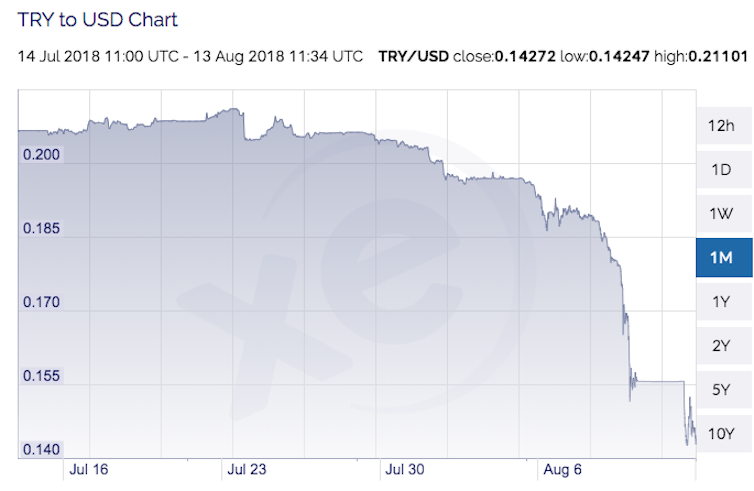Emre Tarim, Lancaster University
Global markets are on edge once again, this time thanks to the Turkish lira. It crashed more than 15% against the US dollar, euro and pound sterling on August 10 and continued to fall when markets reopened after the weekend on August 13.
The latest trigger was Donald Trump’s announcement that he would double import tariffs on Turkish steel and aluminium. But the lira has been falling consistently over the past year as markets fear for the president’s increasing control over the economy.
With their mammoth depth and reach, global currency markets reflect big shifts to new economic and political realities. Sterling dropped by more than 10% when it became clear that the UK had voted to leave the EU in June 2016. Currency markets can also hasten these shifts, for example in 1992 when the UK crashed out of Europe’s fixed currency regime, the Exchange Rate Mechanism, after sustained runs on sterling in currency markets.
The lira crisis therefore – at the very least – reflects the political and economic turmoil taking place in Turkey. It could also play a key role in shifting the country from relying on the West to aid its economic development and turning east to Russia and China for growth and investment.
Crisis and contagion
The underlying economic cause for the crisis is simply a lack of confidence in Turkey’s economy. Inflation is spiralling (currently more than 15%), Turkish companies are saddled with foreign debt and the country has one of the world’s largest current account deficits in proportion to its economic output, heightening fears of a debt crisis.
As an open economy since the late 1980s, Turkey has attracted significant international capital flows. These flows, some of which are highly mobile and short term, also expose Turkey to sudden stops and reversals when international investors fear the worst. The recent history of globalisation in developing countries is full of such crises, including the 2000-01 Turkish banking and currency crisis. It was the aftermath of that crisis that brought Recep Tayyip Erdoğan and his AK party to power.
As of August 2018, Turkey has an external debt of US$406 billion, US$99 billion of which is short term. What worries foreign banks and markets is the exposure of some European banks, as direct investors in the Turkish banking sector. According to estimates, this amounts to more than US$138 billion.

Turkish lira to the US dollar.
xe.com
Should private Turkish debtors, who owe around 75% of Turkey’s external debt, fail to service their share as a result of the nosediving lira and creditors’ unwillingness to lend any more hard currency, the European financial system might have to absorb significant losses. This is similar to what happened during the Greek debt crisis.
Political decisions
None of these debt figures have emerged overnight. What transforms them into a currency and debt crisis is ultimately political. The presidential election in June gave Erdoğan unprecedented control over all branches of the state and he has made his intention to interfere with the economy clear.
Since the new presidential system came into effect, international investors have been trying to understand where Erdoğan would steer the Turkish economy. The signals so far, including Erdoğan’s appointment of his son-in-law as the minister in charge of the economy, suggest a new period of “Erdoğanomics”. This includes a mix of high government spending, politically repressed interest rates and runaway inflation. Such a heady mix has caused a surge in Turkey’s risk premium.
The worsening political relationship between Turkey and the US does not help. Over his 16-year rule, Erdoğan has rallied his supporters on a number of occasions against real and purported threats to his rule. He is once again defiant against Western economic and political actors, whom he accuses of striving to destabilise Turkey under his rule, this time via the runs on the Turkish lira.
This defiance seems to have consolidated Erdoğan’s domestic power, but given the country’s considerable economic reliance on Western banks and markets, the country is now more vulnerable than ever to a currency and debt crisis of its own making. Freeing Turkey from this difficult corner will be a feat. If and when Erdoğan achieves it, Turkey will probably have shifted a considerable part of its economic and political allegiances, from the West to the East, with both Russia and China potential future allies in what Erdoğan has called an “economic war”.
Emre Tarim, Lecturer in Behavioural Sciences, Lancaster University
This article was originally published on The Conversation. Read the original article.